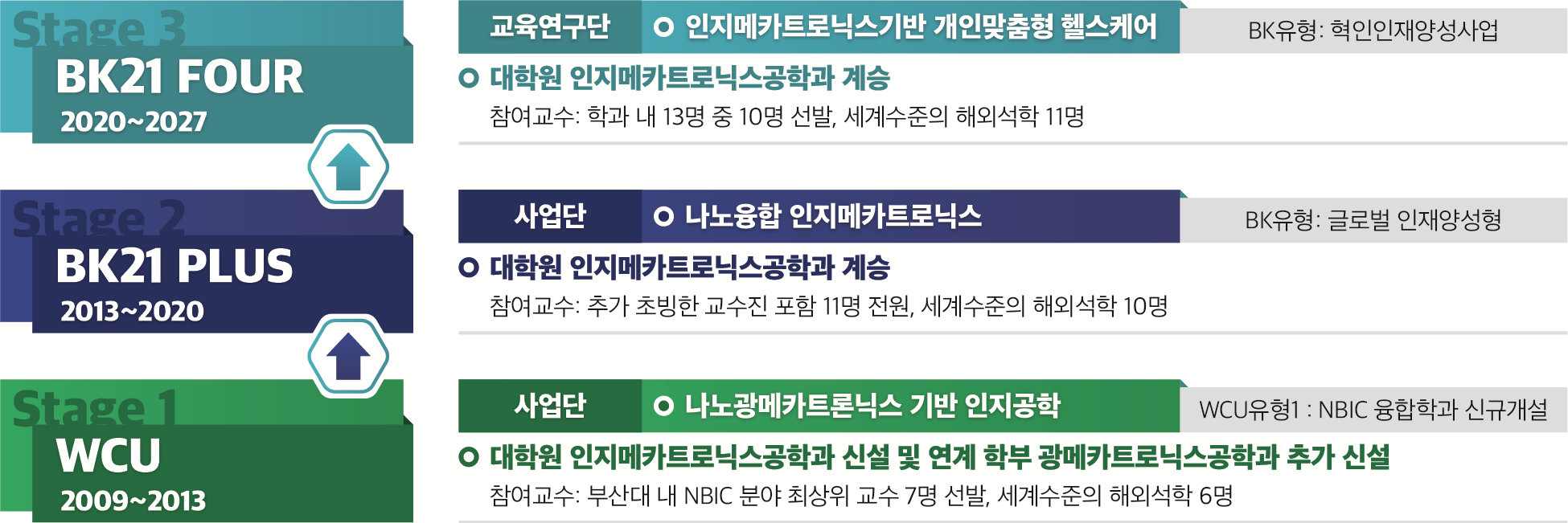fnctId=hist,fnctNo=942
History
| year | contents |
|---|---|
| 2009year 9month |
The first Head, Professor Jeong, Myung Yung (Sep. 2009 - Nov. 2012) |
| 2009year 9month |
Establishment of Department of Cogno-Mechatronics Engineering (MS/Ph.D. courses, 20/10) |
| 2012year 11month |
The second Head, Professor Hong, Keum-Shik (Nov. 2012 - Jun. 2013) |
| 2013year 6month |
The third head, Professor Jeong, Myung Yung (Jun. 2013 - Feb. 2020) |
| 2020year 3month |
The fourth head, Professor Kim, Chang-Seok (Mar. 2020 - Feb. 2028) |
| 2021year 06month |
The fifth head, Professor Kyhm, Kwangseuk (June. 2021 - Present) |
Stabilization and Sustainability of the Educational Research Group at the Bachelor's Level
- The Educational Research Group was established after successfully completing the WCU (World Class University) project in 2009 and subsequently participating in the BK21 PLUS project from 2013 to 2020. Over the past 12 years, the group has acquired innovative educational expertise in the field of cognitive mechatronics and achieved top-tier research results in healthcare-related areas in South Korea. The group has strong educational and research capabilities in the field of personalized healthcare, which it aims to support. Through initiatives like the WCU project, the group has established a wide-reaching network for global education and research, fostering active international exchanges among graduate students.
- Additionally, the group set up research-oriented graduate programs first and then established corresponding undergraduate programs in Mechatronics Engineering. It continually updates comprehensive educational programs to align with the goals of nurturing talents for the Educational Research Group. The group's unique support system, the "Undergraduate Research Program," allows second and third-year undergraduate students to apply for research positions in desired labs during summer and winter breaks, leading to successful cases of publications, including SCI papers, during their fourth year. Approximately half of the incoming graduate students are graduates of the Mechatronics Engineering undergraduate program. The group also supports various programs, such as integrated bachelor-master courses and integrated bachelor-master-doctorate programs, with an increasing trend each year.
- The Educational Research Group engages with over 11 international scholars annually, fostering active physical exchanges through collaborative research, sending graduate students abroad, and organizing invited lectures. These interactions are facilitated by the group's solid foundation and over a decade of experience in the department. The group provides ample opportunities for short- and long-term training and conference presentations to enhance students' international awareness and conduct world-class research.
- To ensure the group's stability and sustainability, the benefits for undergraduate students entering graduate programs will be improved and expanded. The curriculum will be updated to include foundational courses related to personalized healthcare, allowing seamless transitions from undergraduate to graduate programs and maintaining students' sustained interest. Active collaboration with international scholars will continue, actively recruiting top talents to the graduate programs and incorporating a global perspective and cutting-edge technology into the research and development initiatives.
Alignment with the Main Graudate School's Innovation Direction
- Pusan National University's graduate school operates with three fundamental visions: fostering creative knowledge communities, cultivating global specialization in research, and contributing to the local community. The Educational Research Group shares the same context by aiming to lead the world in creative approaches to emerging industries, nurturing professionals with interdisciplinary thinking and skills. The group has received commitments from the university for specialized research environment support and faculty recruitment. This alignment with the innovative direction of promoting regional emerging industries is expected to attract successful educational research groups, creating a mutually beneficial partnership.
- To Foster Integrated Global Leaders at the Main Graduate School, the graduate school plans to establish innovative and differentiated educational programs aligned with the vision of fostering integrated global leaders. This will involve exploring new extracurricular programs and systematically improving the existing curriculum. Financial support and supplementary programs will be coordinated by the university headquarters to enhance the educational experience further.
- For the Achievement of Busan National University's Globally Specialized Research, the Educational Research Group intends to leverage its extensive network developed over the past 12 years through initiatives like the WCU project and Global BK21 project. It aims to actively utilize connections with various international institutions and scholars to facilitate both short and long-term overseas dispatch of graduate students and involve overseas scholars in educational and research activities. Administrative and financial support from Busan National University will complement these efforts. This collaboration is anticipated to elevate the quality and competitiveness of research to a global standard.
- To Align with the Local Community and Campus Integration, the graduate school plans to introduce participation in regional industry-academic cooperation projects as part of the graduate education process. Recently, the Kimhae area in Gyeongnam Province has been designated as a specialized research and development zone in the field of medical devices, and the construction of the Smart Healthcare Complex in Gangseo Eco Delta City, Busan, is underway. These developments present opportunities for expanding the industry in this sector. The graduate school aims to actively engage local community enterprises and utilize their demand for personalized healthcare experiments. Various interdisciplinary technologies will be applied in industrial projects, fostering collaboration between academia and industry. This cooperation is expected to address the specialized skills of graduates and enhance their employment prospects.


